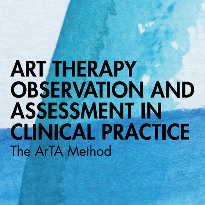|
In this course, Dr. Ingrid Pénzes will give an in-depth introduction to the ArTA method using a mix of experiential work and in-depth theory.
ArTA is an evidence-based, art-focused and neuro-informed art therapy assessment method. This method assists the art therapist to observe adult clients' art making and art products in a focused, systematic and efficient manner, and to interpret these observations in terms of balance and adaptability as positive health aspects. These insights help the art therapist to assess whether the client might benefit from art therapy and, if so, to formulate treatment goals and provide art therapy interventions tailored to the client's needs and abilities. ArTA can also be used to monitor and evaluate treatment progress.
ArTA is based on doctoral research with adult clients with a wide range of problems. It is enriched by art therapy brain research. The concepts of balance and adaptability can be explained from a neuroscientific perspective and transcend different diagnoses and populations. ArTA is currently being researched for its use with children and young people.
Objectives;
After successful completion of this training the participant has an understanding of the theory of the ArTA method. The participant:
1. Knows the ArTA concepts and their interrelatedness
-Material interaction
-Material experience
-Formal elements determining the structure and variation of
the art product
-Balance
-Adaptability
2. Has an understanding of the research behind ArTA
3. Is able to apply ArTA in a case study that is provided
-Is familiar with the four steps of ArTA: observing,
analysing, interpreting and formulating
-Knows how to use the ArTA Observation Form
4. Has a basic understanding of the theory of ArTA from a
neuroscientific perspective
5. Understands how the ArTA assessment is the basis for all
further decisions during the different phases of a treatment
process (clinical reasoning)
6. Recognises this in a case study that is provided
For whom;
Art therapists who want to become intensively introduced to the ArTA method.
It is recommended that you bring the book 'Observing and Assessing Art Therapy in Clinical Practice, the ArTA Method', which is available through all the known channels such as: Art Therapy Observation and Assessment in Clinical Practice: The ArTA
Following on from this 3-day training, students will have the opportunity to be certified to use ArTA in their own art therapy practice:
To become certified at ArTA, you must be able to demonstrate your ability to use ArTA with a client from your own practice/workplace. You will be guided through 2 online group meetings of each 2 hours (max. 5 participants per group) and individual coaching by email.
In the group meetings experiences, questions, bottlenecks during practicing ArTA are brought in for reflection and discussion. Please consider an additional 8 hours of practicing with your client in your own practice using the ArTA Observation form. The participant will receive an ArTA Basic Certificate if the completed ArTA Observation form shows that the objectives have been met. Costs: €275.
This option will be offered by Dr Ingrid Pénzes and will take place if at least 3 participants are interested. The deadline for expressing interest is 10 October,2025 using this link: Register | Ingrid Penzes or sending an email to: mail@ingridpenzes.com
The two meetings will be planned in consultation with the participants.
About the trainer;
Ingrid Pénzes PhD., is a Dutch art therapist and mental health scientist and holds a doctorate in social sciences focusing on the relationship between the art form and mental health. After almost 20 years of teaching art therapy and leading an arts therapies program in the Netherlands, she has been an independent writer, researcher and lecturer since 2021 at Where Art meets Health. Her primary mission is to translate scientific knowledge into education and practice, providing training, research and assessment for institutions, companies and professionals.
Based on the findings of her PhD and brain research, she developed the ArTA method for art therapy assessment, wrote several books about it and trains art therapists and art therapy educators.
Teas and Coffees will be provided. All participants will contacted in September with a detailed timetable.
.png)
|



.png)